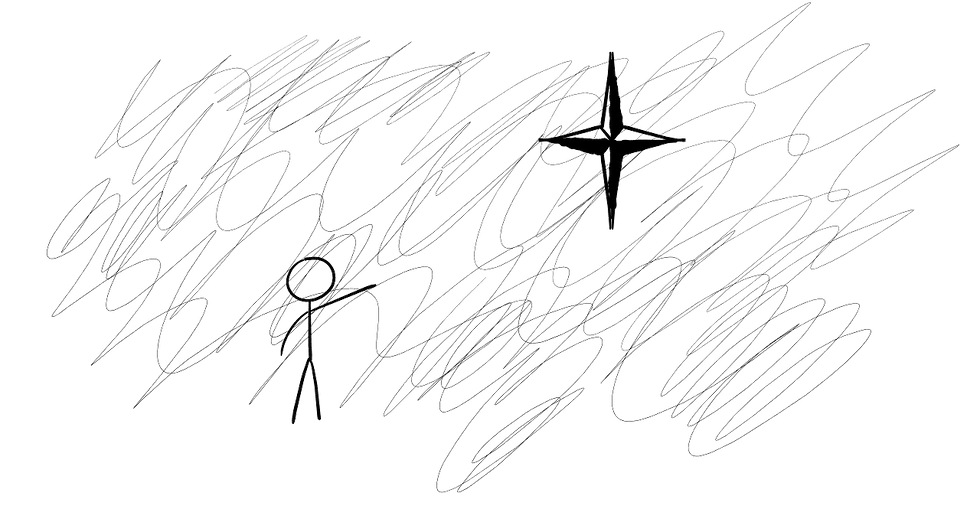FINDING DIRECTION IN LIFE
- Derek Hagen

- Jun 13, 2024
- 3 min read

❝If you don't know where you are going you might wind up someplace else.❞ -Yogi Berra
There's a classic scene in Lewis Carroll's classic Alice's Adventures in Wonderland where Alice talks to The Cheshire Cat:
Alice: Would you tell me, please, which way I ought to go from here?
The Cheshire Cat: That depends a good deal on where you want to get to.
Alice: I don't much care where.
The Cheshire Cat: Then it doesn't matter which way you go.
Alice: So long as I get somewhere.
The Cheshire Cat: Oh, you're sure to do that, if only you walk long enough.
Now, of course, Alice could get somewhere by walking aimlessly. Alternatively, she could go in a direction she thinks she should go.
However, Alice might be more content if she was more intentional about which way she went.
DIRECTION
Finding direction is more challenging than it seems. Humans seem to be conflicted about whether we actually like having choices. On one hand, autonomy - being free to make our own choices - is one of our core psychological needs. On the other hand, we don't like being held responsible for our choices.
When we come to a fork in the road, we may be paralyzed because we fear not making the "right" choice.

The unfortunate truth, though, is that we're not likely to face many "forks in the road." Instead, we're often confronted with too many choices. Psychologist Barry Schwartz calls this The Paradox of Choice.
When confronted with too many options, we have a tendency to rely on what we think we're supposed to do, or what other people do.

PURPOSE
In the field of meaningful living, having a direction in life that matters to you is referred to as purpose.
Think of purpose like a beacon or lighthouse that guides you. Or, if you're not into water navigation, think of purpose as a North Star.
Your purpose gives you direction and helps you orient to what matters to you.

The best thing about having a North Star (or beacon) is that it helps guide you even in the fog!

TARGETS
It's tempting to think that purpose has to be grandiose or Earth-shattering. Though it's possible for some people to have a purpose that big, for most of us, having a purpose that's closer to home is more than sufficient.
Instead of thinking of purpose as something large, think of it as a target.

A target gives you something to aim for.

WRITTING IN PENCIL
We can close the door on another possible misunderstanding about purpose. We don't have to etch anything in stone. Instead, we write in pencil.
Purpose sets your direction, like that North Star that you aim for.

Once you know where you want to go, you can implement systems to get you there.

But you don't have to stick to it just because it's there. Remember, this is written in pencil. You can change your mind.
To not change your mind is to ignore new information. Tastes change, preferences change, and even values sometimes change.
Life happens.

That's okay. It gives you the opportunity to start working toward your new vision!

Having direction in life gives you something to work towards and helps you live in line with what's important to you.
You get one life; live intentionally.
If you know someone else who would benefit from reading this, please share it with them. Spread the word, if you think there's a word to spread.
To share via text, social media, or email, simply copy and paste the following link:

Subscribe to Meaningful Money
Thanks for reading. If you found value in this article, consider subscribing. Each week I send out a new post with personal stories and simple drawings. It's free, and there's no spam.
REFERENCES AND INFLUENCES
Barker, Dan: Life Driven Purpose Ben-Shahar, Tal: Choose the Life You Want Gillihan, Seth: Mindful Cognitive Behavioral Therapy
Hagen, Derek: Money’s Purpose in Your Life
Hagen, Derek: Your Money, Your Values, and Your Life
Haidt, Jonathan: The Happiness Hypothesis
McKay, Matthew, John Forsyth, and Georg Eifert: Your Life on Purpose
Sinek, Simon: Start With Why
Sinek, Simon, David Mead & Peter Docker: Find Your Why


















